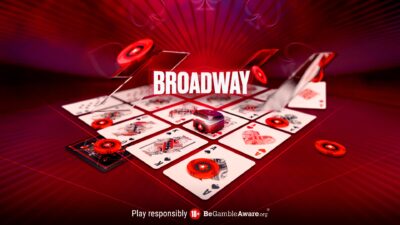We’d like to take this opportunity to wish a Happy New Year to all readers of the PokerStars Blog. January is typically a time for new beginnings and resolutions, and that includes poker players. We’d like to help you start the year in the best possible way.
That means improving your poker game. We think the best way to do that is to practice, to study, and to learn from the best. PokerSchoolOnline intends to help you do just that, drawing on years of experience from some of the finest players in the game.
We’ve collated the advice of PokerStars Team Online members, the first of which is published below. Each has provided their thoughts and tips on how to improve, regardless of whether you’re an experienced player or starting out new. Some answers are long, others are short, but all should help you transform your poker game in 2016.
We asked members of Team Online five questions.
1. What goals would you suggest for a beginning player?
2. What goals to set yourself in order to grind a long tournament or poker session?
3. Thinking back to when you started playing poker, what goals do you think led you to becoming pro?
4. What percentage do you feel a beginning player should be playing poker compared to studying poker?
5. What should we avoid when setting our goals so that we have a realistic chance of achieving them
Today and next week we’ll be publishing what they had to say, starting with Lex Veldhuis, Caio Pessagno and Mickey Petersen. Here’s what they had to say.
Mickey “mement_mori” Petersen
Started playing in 2008


Don’t overwhelm yourself with too many tables! A lot of beginning players go backwards about it and overwhelm themselves with more tables than they can make quality decisions at. Playing a lot of tables is great but it usually plateaus your skill level a bit. Focus on making good decisions and self-reflection, and only once you are really comfortable with your game start slowly adding more tables.
2. What goals to set yourself in order to grind a long tournament or poker session?
I often play long tournament sessions. I think some of the things that are the most important are:
– Not get tilted when you bust deep in a tournament. So often you see people getting unlucky in one tournament and immediately start making really poor decisions in all the rest of their tournaments. That gets expensive very fast!
– Keep on playing even if you have a poor start, or busted the tournament you were looking forward to the most that day. A lot of people stop registering as soon as something doesn’t go their way, that’s an ineffective use of time and shows a poor mind-set.
3. Thinking back to when you started playing poker, what goals do you think led you to becoming pro?
I think having a healthy mix of micro and macro goals helped me a great deal. Micro goals are things like making my first cash-out, slowly moving up the stakes, making more contacts in the poker world and feeling my game becoming more robust. On the macro level watching fellow countryman Gus Hansen winning a big televised tournament and imaging myself in the same situation one day if I worked hard enough at it.
Check out PokerSchoolOnline to start working on your own poker goals for 2016.
4. What percentage do you feel a beginning player should be playing poker compared to studying poker?
I do think it’s dependent on the person, because when you are starting out there is a lot of educational value in just playing – a lot of the decisions are still new to you and you get to try thing by trial and error. That being said I think anyone who plays 75-80% of the time and study 20-25% of the time is going to have a really strong starting point.
5. What should we avoid when setting our goals so that we have a realistic chance of achieving them?
It’s fine to have long-term goals but make sure to make smaller achievable goals along the way to help you as well. I don’t like monetary goals too much for tournaments because of the swings, so things like rating your game from 1-10 on every break; making sure your evbb is healthy, and that you play in your best state of mind are important.
One thing I personally like to do as well is to keep track of my sessions and every time I play a good one (regardless of results) I get a point. When I get to X amount of points I get to cash in a prize. It can be anything from a cinema trip with my girlfriend to a new video game or an exotic vacation. The great thing about that is that you can adjust those goals as low or high as you are comfortable with and it makes me more motivated to play, especially doing a downswing. It might not work for everyone but it’s something I personally have had a lot of success with.
Caio “Pessagno” Pessagno
Started playing in 2005


Be strong and patient, if you really want this, you can get there.
2. What goals to set yourself in order to grind a long tournament or poker session?
Plan yourself, save energy, don’t waste your time with distractions.
3. Thinking back to when you started playing poker, what goals do you think led you to becoming pro?
Freedom, money, independence.
4. What percentage do you feel a beginning player should be playing poker compared to studying poker?
My time was like, 90/10 playing/studying. But you have to know, playing = studying, experience is the most important skill you can get.
5. What should we avoid when setting our goals so that we have a realistic chance of achieving them?
Be aware of the distractions, of how much little things can put your dream away. Save your time, made sacrifices, and use the maximum time you can get to improve. Finally, never give up. Understand the math of the game, and don’t waste your time complaining.
Lex “L. Veldhuis” Veldhuis


A lot of beginning players want to play at a level that they feel they can beat. I think it’s very important to start very low. Most of the times when I suggest this people say ‘But people there don’t know how to play poker. I want to play real poker.’ My simple reply to that is ‘Then it shouldn’t take you long to beat that level and move up to the next stakes.’ I started out playing 1c/2c with $10 to my name. I think one of the reasons I became good was that my basics were very solid. I beat every level going up and I had seen every style.
Another very important thing is don’t focus on volume. You can start playing a lot of tables when you have a solid grasp of the basics. Putting more time in moving up and getting better will make you a lot more money than playing 24 tables of $10 buy-in. Play 2-3 tables and constantly ask yourself why you are doing stuff.
2. What goals to set yourself in order to grind a long tournament or poker session?
It’s important to train your attention span. You can’t just start out playing ten hours in a row. Play small fields at first or short cash game sessions. Build it up from there. If you feel you are just clicking buttons stand up and take a break. One mistake could mean you wasted three hours of work. You have to be focused all the time. Make sure you eat well and do exercises.
Check out PokerSchoolOnline to start working on your own poker goals for 2016.
3. Thinking back to when you started playing poker, what goals do you think led you to becoming pro?
What I really liked when I started was the fact you could start low and train yourself. There were so many levels to beat it felt like a competition. Also the highest levels are very visible so I would always watch the people that played there and thought to myself that I want to make that level one day. It’s very important to love the game itself too. It’s not a quick way to make money. It’s hard work.
4. What percentage do you feel a beginning player should be playing poker compared to studying poker?
I think the studying is very important. I would say 50-50 is a good ratio. You play and then you study or examine the situations you’ve experienced. If you are in a tough situation write down specifically what that situation was and then just think about it. How do you want to be playing in general in that spot. When other people do something weird don’t just say he is dumb and he is bad. Think if there is some merit to what your opponent is doing. Maybe he learned something you’re not aware of yet. Studying is crucial in getting better.
5. What should we avoid when setting our goals so that we have a realistic chance of achieving them?
You have to set attainable goals. If you say I want to make $1,200 this month you are setting yourself up for failure. There is variance in poker and some months you will lose. You could say at the end of the year I want to have moved up two stakes. Set goals that you can actually achieve. When you’ve never studied before don’t put ‘Study 5 hours on Tuesday’. It’s not going to happen. Instead start with 30 minutes. Same with playing. You can’t start playing ten hours a day out of the blue. It requires training. Allow yourself that time. Build it up and if you achieve the goals you set you will get motivated even more.
Ready to put this advice to the test? Click here to open a PokerStars account. Check back for more advice from the pros next week.
Stephen Bartley is a staff writer for the PokerStars Blog.
Back to Top






